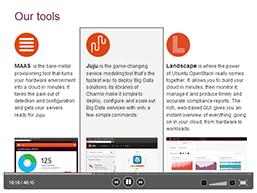Ubuntu in the cloud
Whether you’re launching your app in a public cloud using Ubuntu, building an on-premise cloud using Ubuntu OpenStack or looking for a managed OpenStack cloud solution, we offer all the expert knowledge, software, services and support you need.
More Ubuntu is used in the cloud than all other operating systems combined and Ubuntu OpenStack is the leading OpenStack solution for telcos globally, with over 65% of large deployments and the platform of choice for NFV.
Check out our Ubuntu server, Ubuntu OpenStack, Juju and telco resources:
-
Low latency and real-time kernels for telco and NFV
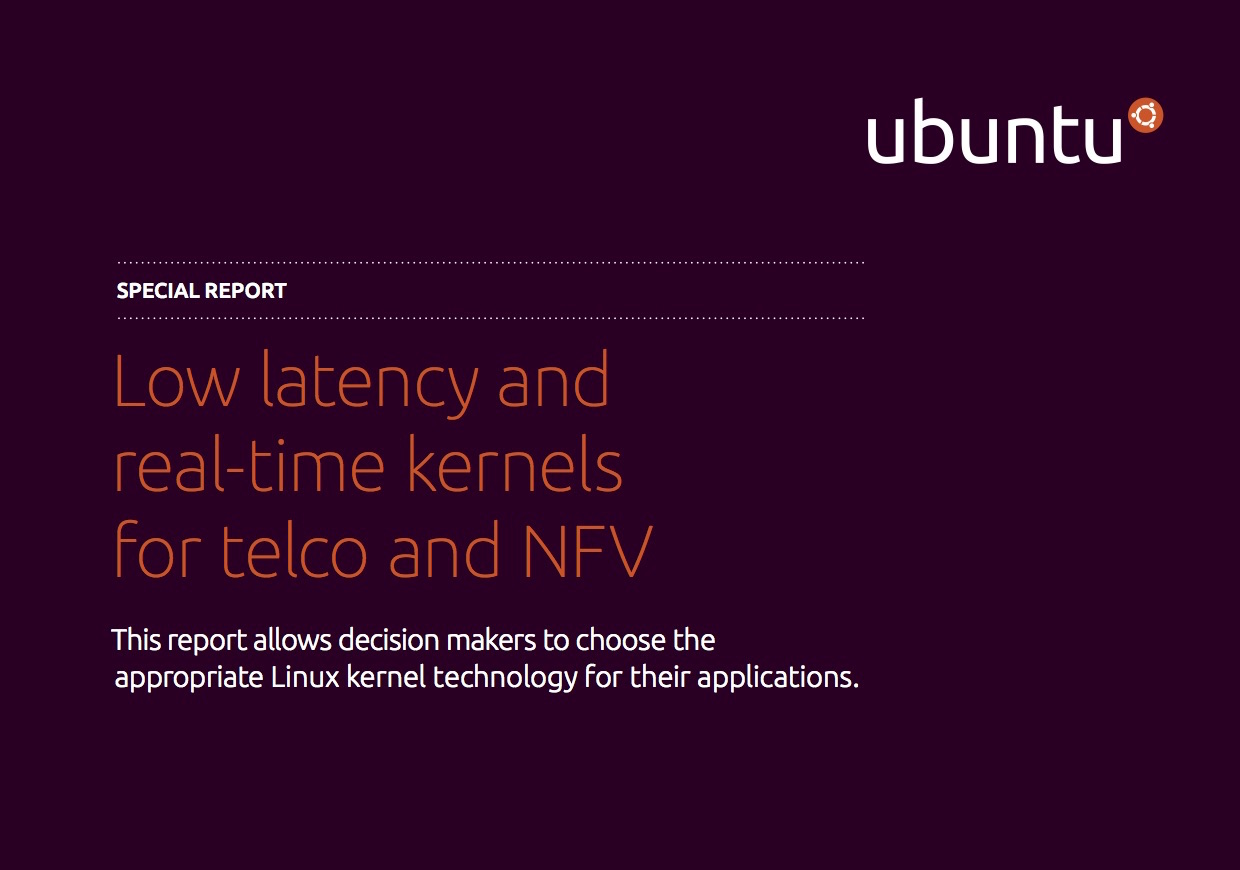
Recently, Network Functions Virtualisation (NFV) has taken root in the production environments of telecoms operators. The individual components of NFV, known as Virtualised Networks Functions (VNFs), are critically tied to a general purpose operating system, as opposed to being integrated into application-specific devices. This union makes performance and support of core operating system components, like the kernel, the foundational metrics of success.
There are flexibility and economic benefits of using general purpose software for function-specific applications, but as VNFs are mission critical services in a telco infrastructure, certain key, determining factors should be kept in mind when selecting an operating system to host them.
This special report will demonstrate that Ubuntu 16.04 LTS offers the necessary, proven reliability, while also offering supported kernel choices that enhance the efficiency of VNF operations and functions.
-
Analytics and Big Data, Solutions for Telcos

An outline of the analytics processes telcos should implement, to benefit from the tremendous amounts of data available to them. This eBook answer the following questions:
- How can big data and analytics solve the challenges faced by modern telecoms providers?
- How can telcos boost revenue and dramatically reduce time to identify new markets and solutions, using a data-first approach?
-
NFV and SDN on OpenStack for network operators
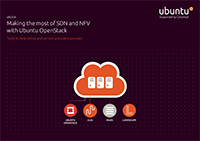
Network Functions Virtualisation (NFV) and Software-Defined Networking (SDN) are two of the hottest infrastructure technologies around, particularly for telecoms and network operators wanting to map their services in a more efficient, scalable, and cost-effective way.
The eBook also presents a reference architecture for integrating NFV and SDN technologies onto Ubuntu OpenStack clouds, allowing for maximum flexibility in configuration, management, and scaling.
-
eBook: Certified Ubuntu Cloud Guest
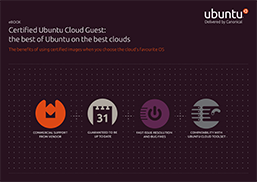
-
Ubuntu Advantage virtual guest datasheet
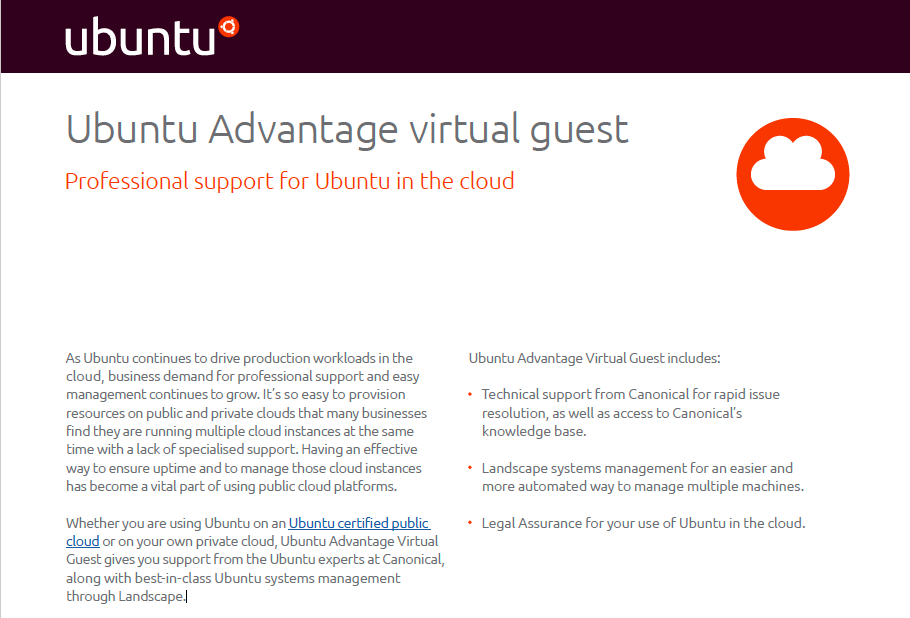
Whether you are using Ubuntu on an Ubuntu certified public cloud or on your own private cloud, Ubuntu Advantage Virtual Guest gives you support from the Ubuntu experts at Canonical, along with best-in-class Ubuntu systems management through Landscape. Read this datasheet to learn more
-
eBook: CIO’s guide to SDN, NFV & VNF
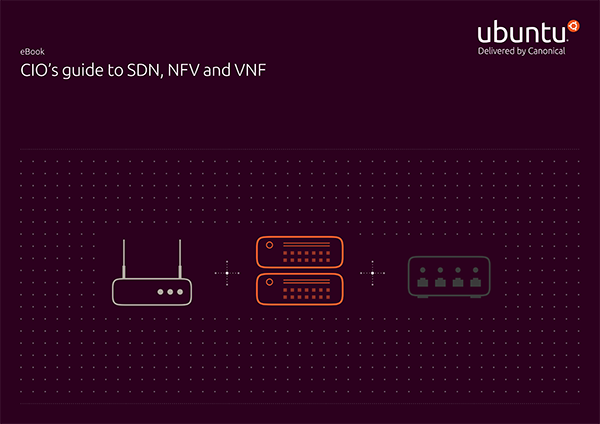
Networking and communications standards are undergoing the greatest transition from function-specific, proprietary devices to software-enabled commodity hardware.
- learn why the transition is happening, and why it’s important to understand and embrace this emerging opportunity
- learn about the potential benefits, and some deployment and management solutions for software-enabled networking
-
Juju: The Application Marketplace for Big Data
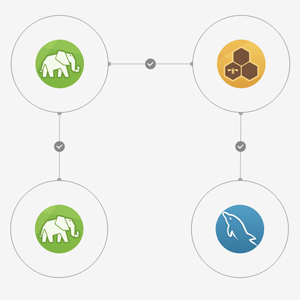
Juju is a one-stop shop for your big data application needs. The Juju Charm Store has over 300 Charms for big data applications available to be deployed with a simple click or a single command.Find, select, associate, deploy and integrate Big Data applications quickly and easily.
-
Flexwebhosting spins up services in record time
Flexwebhosting, one of the largest web hosting providers in the Netherlands has chosen BootStack, Canonical’s managed cloud offering as well as Juju, its service modelling tool, to reduce time to service from days to minutes.
-
Renting bare-metal (as a Service) with MAAS

Read the blog to learn why bare-metal has hardly featured in the cloud revolution and find out more about MAAS, Canonical’s bare-metal as a Service.MAAS automates all aspects of hardware provisioning, from detecting a racked machine to deploying a running, custom-configured operating system.
-
Delivering Cloud Storage using Ubuntu
Are you offering cloud storage solutions to your end-customers? You could be, and given the potential, we reckon you should be. In the past 5 years software-defined storage (SDS) platforms like Ceph and Swift have evolved dramatically; today they are redefining the cost of durable, shared storage infrastructure delivered at enterprise-level SLAs.
Find out more about delivering cloud storage using Ubuntu.
-
BootStack Direct private cloud solution
BootStack Direct is an OpenStack cloud offering by Canonical. The offering gives you an OpenStack private cloud running where you choose, your datacentre or a service provider, while Canonical’s engineering team takes on the responsibility of design and initial deployment of your cloud.
-
Canonical OpenStack Datasheet
Canonical OpenStack is a reference architecture OpenStack deployment that includes additional tools for installation, management, and most importantly, solution design and deployment. It builds on Ubuntu OpenStack, which includes all of the the core services, as well as many other big tent services.
With the unique, GUI-based installer, OpenStack Autopilot, it is the fastest and easiest way to build an OpenStack cloud.
-
Juju: Connecting the World of IOT
Juju is the fastest way to quickly model, relate, deploy and integrate big data software for IoT. By using what we call Charms and Bundles, Juju allows you to lay out your multi-application IoT solution on a blank canvas, associate the application relationships, and deploy that solution. You can rework the canvas, and re-deploy at any time.
-
Transactional updates with Ubuntu Core
Snappy Ubuntu Core is a new, transactionally updated Ubuntu for clouds and devices. In allows for transactional updates – a minimal server image with the same libraries as today’s Ubuntu, but applications are provided through a simpler mechanism. The snappy approach is faster, more reliable, and lets us provide stronger security guarantees for apps and users.
Snappy highlights:
- World-leading security
- Safe, reliable updates
- Designed for Docker
- Amazing developer experience
- Easily extensible with frameworks
-
Deploy Big Data Services the easy way
Big data solutions involve many technologies working together. Whether it’s collection, analysis, or action, all of those components must be configured, their relationships defined, and deployed. In today’s dynamic data environment, the deployment is bound to change, need to be updated, or replicated. You need an infrastructure and tool set that keep your focus on the data.
This webinar discusses:
- flexibility in big data infrastructure automation
- and provides use case examples
-
LXD: the Linux container hypervisor from Ubuntu
LXD is the Linux container hypervisor from Ubuntu. Download this datasheet to learn about the following:
- What is a container?
- What’s special about LXD?
- Which is the right container for your needs?
- Docker or LXD?/li>
- LXD Highlights
- Using Juju with Containers
-
Big Data Explained, Analysed, Solved
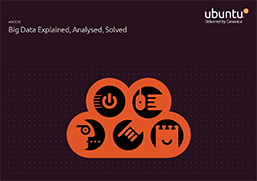
An overview of the meaning and growing importance of Big Data. Learn about the different kinds of Big Data and and their application. This eBook answers the following questions:
- What is Big Data and why is it important?
- Do I need a cloud for Big Data?
- How do I design, deploy, and package Big Data solutions?
- How do I use OpenStack as a Big Data warehouse?
- How do I run Big Data solutions in a managed cloud?
-
Building a private cloud? Taking the leap

In this eBook, you will read about moving your Ubuntu OpenStack private cloud from the proof-of-concept stage to a production environment.
It covers technical and organisational aspects, and gives you some best practices on running your Ubuntu OpenStack private cloud in production and making it future-proof.
-
How to face the challenges of becoming a cloud operator
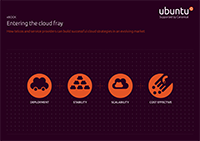
In a shifting market, the traditional revenues of telcos and service providers are under threat. Voice revenues are at an all-time low, and high wireless data costs are negatively impacting margins. As an additional challenge, many enterprises are moving low-value workloads and applications to public clouds such as Amazon, eroding traditional managed hosting revenues.
-
Make IT rain: public cloud on Ubuntu OpenStack

Ubuntu OpenStack is the most trusted platform on which to build a public cloud. One of the best things about it is the ease of moving from a proof of concept or small lab-based deployment to a large, scalable, production one. In this brochure, we discuss some basics about running Ubuntu OpenStack for public clouds, and give you some tips and tricks to make the most of your deployment.
-
How Ubuntu OpenStack makes the cloud work for telcos and SPs
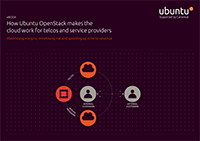
Telcos and Service Providers expect near 100% uptime and the flexibility to scale their infrastructure up and down on-demand. This requires a proven cloud platform that minimises time-to-revenue and ensures predictable costs.
Discover how Ubuntu OpenStack enables Telcos to maximise margins, reduce the costs and risks of introducing new value-added services and speed up time-to-revenue.






